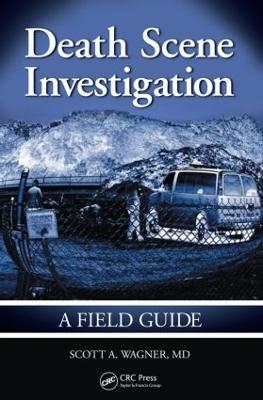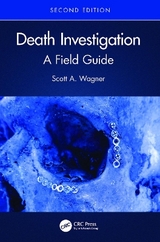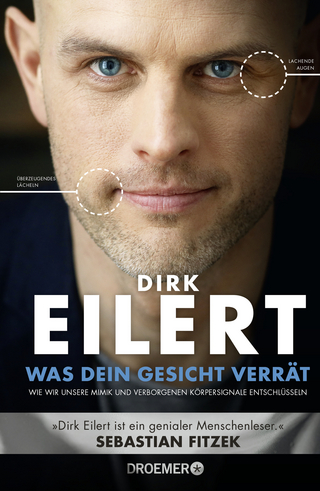
Death Scene Investigation
A Field Guide
Seiten
2008
Crc Press Inc (Verlag)
978-1-4200-8676-8 (ISBN)
Crc Press Inc (Verlag)
978-1-4200-8676-8 (ISBN)
- Titel erscheint in neuer Auflage
- Artikel merken
Zu diesem Artikel existiert eine Nachauflage
A field guide that provides easy direction for the death scene investigator. Organized in an easily accessible outline format, it covers protocols and guidelines, assessment and examination, use of medical history and records, autopsy, and death certification. It also includes a medical glossary, and over 150 color photographs.
Each and every death scene presents new challenges to even the most seasoned investigator. Despite the unique nature of each scenario, using a standardized protocol is the key to ensuring consistent and accurate results. Death Scene Investigation: A Field Guide provides concise direction for the death scene investigator, crime scene investigator, coroner, medical examiner, or anyone associated with the investigation of death.
Since the majority of deaths are due to natural causes, the book emphasizes these situations, yet also examines unnatural circumstances. It begins by providing a general overview of death investigation before delving into a chronological point-by-point analysis of the death scene. Topics discussed include how to assess the body at the scene, and how to investigate natural and unnatural deaths.
Explores Various Causes
Next, the text demonstrates how death manifests in various parts of the body. A section on traumatic injuries examines and demonstrates with color photographs blunt force, sharp force, and a host of other injuries that the death examiner is likely to confront.
The book addresses identification methods and explores how to determine signs of resuscitation and previous surgeries. It concludes with a discussion of the purpose and performance of the autopsy and provides a survey of the different forensic experts that may become useful to the death investigator.
Enhanced by numerous color photos, this volume is a direct, succinct handbook that is invaluable to those that confront the reality of death on a day-to-day basis. Its convenient format makes it the perfect guide to take along to the scene.
Each and every death scene presents new challenges to even the most seasoned investigator. Despite the unique nature of each scenario, using a standardized protocol is the key to ensuring consistent and accurate results. Death Scene Investigation: A Field Guide provides concise direction for the death scene investigator, crime scene investigator, coroner, medical examiner, or anyone associated with the investigation of death.
Since the majority of deaths are due to natural causes, the book emphasizes these situations, yet also examines unnatural circumstances. It begins by providing a general overview of death investigation before delving into a chronological point-by-point analysis of the death scene. Topics discussed include how to assess the body at the scene, and how to investigate natural and unnatural deaths.
Explores Various Causes
Next, the text demonstrates how death manifests in various parts of the body. A section on traumatic injuries examines and demonstrates with color photographs blunt force, sharp force, and a host of other injuries that the death examiner is likely to confront.
The book addresses identification methods and explores how to determine signs of resuscitation and previous surgeries. It concludes with a discussion of the purpose and performance of the autopsy and provides a survey of the different forensic experts that may become useful to the death investigator.
Enhanced by numerous color photos, this volume is a direct, succinct handbook that is invaluable to those that confront the reality of death on a day-to-day basis. Its convenient format makes it the perfect guide to take along to the scene.
Scott A. Wagner
Guidelines for the Death Scene Investigator. The Body and the Scene. Assessment of the Body at the Scene. Detailed Physical Assessment of the Body at the Scene. The Medical History and Medical Records. Natural Diseases and Death Investigation. Traumatic Injuries. Identification Methods.
Signs of Cardiopulmonary Resuscitation and Treatment.
Signs of Previous Surgeries and Procedures. The Medical-Legal Autopsy. Forensic Experts. Bibliography. Appendix A: Medical Terminology. Appendix B: Prescription Medicines.
| Erscheint lt. Verlag | 5.12.2008 |
|---|---|
| Zusatzinfo | 178 Halftones, black and white; 179 Illustrations, color; 179 Illustrations, black and white |
| Verlagsort | Bosa Roca |
| Sprache | englisch |
| Maße | 156 x 234 mm |
| Gewicht | 640 g |
| Themenwelt | Recht / Steuern ► Strafrecht ► Kriminologie |
| ISBN-10 | 1-4200-8676-6 / 1420086766 |
| ISBN-13 | 978-1-4200-8676-8 / 9781420086768 |
| Zustand | Neuware |
| Informationen gemäß Produktsicherheitsverordnung (GPSR) | |
| Haben Sie eine Frage zum Produkt? |
Mehr entdecken
aus dem Bereich
aus dem Bereich
wie wir unsere Mimik und verborgene Körpersignale entschlüsseln
Buch | Hardcover (2022)
Droemer (Verlag)
20,00 €



